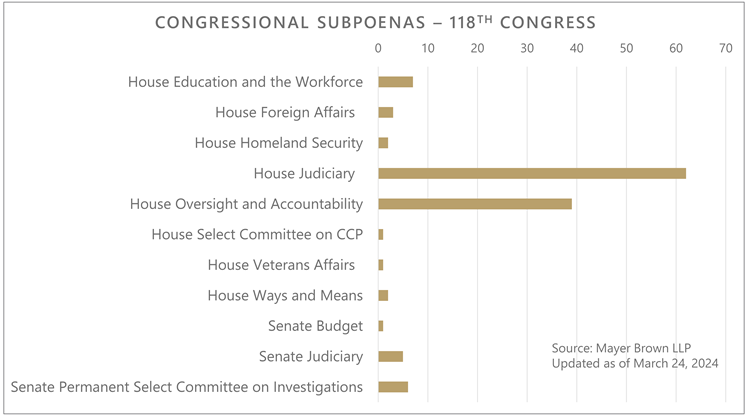What Does the Narrowing Republican House Majority Mean for Congressional Investigations?
Two developments last week threaten to weaken Republican control over the investigative agenda of the US House of Representatives. First, House Republicans’ narrow majority continues to shrink, with Representative Mike Gallagher (R-WI), Chairman of the House Select Committee on the CCP, announcing he will leave Congress in mid-April. Second, a Republican member threatened to use a procedural tactic to remove Speaker Mike Johnson (R-LA). As a result, it could prove difficult to enforce committee subpoenas through litigation, or to hold subpoena recipients in contempt of Congress for failure to comply with committee demands. Democrats might also seek changes to House rules and committee practices in exchange for supporting Speaker Johnson, and such concessions could erode Republicans’ ability to unilaterally control investigations. These developments in the House will not, however, impact investigations by Senate committees.
Overview of subpoenas issued this Congress
Committees in both the House and Senate are authorized, under their respective chamber rules, to use subpoenas in an effort to secure documents and testimony, including from private sector entities. Committees may (but are not always required to) publicly disclose the issuance of subpoenas, and there is no central repository of House and Senate subpoenas.
We closely track trends and monitor subpoenas issued in both chambers and publicly disclosed by committees involved in oversight efforts. Since the start of the 118th Congress in January 2023, House and Senate committees have issued at least 129 subpoenas, with House committees issuing the overwhelming majority. Around two-thirds of these publicly disclosed subpoenas have sought documents, while the remainder demanded testimony at depositions or public hearings. A breakdown by congressional committee is below.

Nearly half of the subpoenas issued during this Congress have been sent to non-governmental entities, including private persons, corporations, and non-profits. The companies receiving subpoenas represent a variety of industries, including banking, asset management and investment funds; as well as technology, social media, entertainment, and communications. A summary of pending congressional investigations impacting the private sector can be found in our January 2024 Legal Update.
Methods to enforce congressional subpoenas
If a committee believes a subpoena recipient is being uncooperative—either by ignoring a subpoena entirely or by giving a response the committee finds insufficient—the committee may (i) seek to enforce the subpoena in federal court; and/or (ii) vote to hold the subpoena recipient in contempt of Congress.
Under House rules and practice, litigation to enforce a committee subpoena directed to a governmental or private entity can be authorized in two ways: (i) by a vote of the full House; or (ii) by a majority vote of the Bipartisan Legal Advisory Group (the so-called “BLAG”), comprised of the Speaker, Majority Leader, Majority Whip, Minority Leader, and Minority Whip. The BLAG is therefore structured to ensure majority party control of most litigation decisions.1
House committees may also seek to have uncooperative subpoena recipients charged with contempt of Congress, under 2 U.S.C. § 192, by referring a contempt resolution to the full House for a vote. Unlike commencement of litigation, a contempt determination is not delegated to the BLAG. While the contempt statute contemplates that the Speaker of the House may certify the committee’s contempt referral without a floor vote under certain circumstances, this procedure is disfavored.
Looking ahead
This month, a Republican House member introduced a resolution to remove Mike Johnson (R-LA) as Speaker. Although no steps have been taken yet to force a vote on the resolution, the vote could happen shortly after the House returns from recess next month. When the Office of the Speaker was vacant last year, committee subpoena issuance nearly stopped altogether. This was partly due to the instability in the House, and also because, in recent Congresses, the Speaker exercised an informal soft power of advising committees on subpoena issuance.
Due to Republicans’ slim majority—and the partisan nature of nearly all pending House investigations—it is unlikely that a House committee will seek a vote of the full House to initiate litigation to enforce any pending subpoenas, at least in the short term. House committees will instead rely on the Republican-controlled BLAG to commence most subpoena litigation. Indeed, in a case to enforce a deposition subpoena filed last month by the House Judiciary Committee, the litigation was authorized by a 3-2 BLAG vote, with Democratic Leader Hakeem Jeffries (D-NY) and Democratic Whip Katherine Clark (D-MA) voting against the litigation. If the Office of the Speaker becomes vacant again and a temporary Speaker is named, there is likely no ability to enforce subpoenas by litigation during the vacancy—it is not clear that a temporary Speaker could serve on the BLAG, and the vote of the remaining leadership members would deadlock 2-2 on any partisan investigation. Litigation previously authorized by a former Speaker could also be called into question by the litigants, or perhaps by the Democratic members of the BLAG. With respect to a contempt of Congress citation, a slim Republican majority means the success of a contempt vote on the House floor is highly uncertain.
Democrats might also seek concessions impacting congressional investigations in order to support the continuation of Johnson’s speakership. These could include termination of pending litigations or certain committee investigations, changes to the House Rules to require a unanimous vote of the BLAG to commence litigation, and/or changes to the House rules to require consent of committee Democrats to issue subpoenas.
***
So long as Republicans maintain even the slimmest majority in the House—and the Speakership remains stable—Republican committee chairs and Republican leadership can control the chamber’s oversight and investigation agenda. Recent developments may serve to weaken these investigative efforts if litigation is stalled, or if subpoena recipients decide not to fully comply with subpoenas they determine are not enforceable. Given House investigators’ intense focus on private sector entities this Congress, Mayer Brown will continue to monitor these developments and their implications for committee investigations.
1 For additional information about litigation by House committees and the role of the Speaker of the House and the BLAG in subpoena issuance and enforcement, please contact Mayer Brown partner Kim Hamm, who served as the Speaker’s counsel on BLAG, and in the House General Counsel’s office where she litigated subpoena enforcement cases on behalf of House committees.





